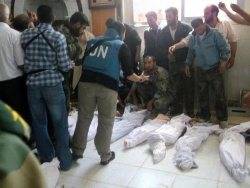The United Nations Security Council (UNSC) has unanimously condemned the use of heavy weapons in the Houla massacre that left 108 people killed, including 49 children and 34 women.
The council said in a press statement issued after an emergency meeting on Sunday that the "outrageous use of force" against civilians violated international law and Syrian government commitments under Security Council resolutions to cease violence, including the use of heavy weapons in populated areas.
"The Security Council condemned in the strongest possible terms the killings, confirmed by United Nations observers, of dozens of men, women and children and the wounding of hundreds more in the village of [Houla], near Homs, in attacks that involved a series of government artillery and tank shellings on a residential neighborhood," the non-binding statement said.
The UN body again demanded that the forces of President Bashar al-Assad withdraw heavy weapons from Syrian towns.
Britain and France had proposed a statement making an even stronger condemnation of the Assad government. But Russia would not agree on the wording and demanded a special meeting before approving the statement.
"It still remains unclear what happened and what triggered what," Russia's deputy UN ambassador Igor Pankin told reporters after the meeting.
"There are substantial grounds to believe that the majority of those who were killed were either slashed, cut by knives, or executed at point blank distance," he said before the meeting.
"It is difficult to imagine that the Syrian government would not only shell... but also use point-black execution" against dozens of women and children, he said.
Al Jazeera's Kristen Saloomey, reporting from the UN headquarters in New York, said the intention behind the Security Council's statement was to come out with a quick and unified response to Friday's massacre.
“What we have is a statement that was agreed to by all members of the Security Council [that was] watered down a bit".
'Tsunami of lies'
British Ambassador Mark Lyall Grant did not have any doubts about who was responsible for the events in Houla.
"It seems quite clear that the massacre in Houla was caused by heavy bombardment, by government artillery and tanks," Lyall Grant said. After the council meeting he said it was time for the council to discuss "next steps" - a code word for sanctions.
"The fact is, it is an atrocity and it was perpetrated by the Syrian government," Lyall Grant said.
Syrian UN Ambassador Bashar Ja'afari reiterated his government's denial, saying the massacre was committed by "armed terrorist groups" - the Syrian government's term for the revolution forces.
He also dismissed the "tsunami of lies" of the British, French and German envoys, who blamed the government for the massacre.
Calling the statements "pitiful and regrettable", Ja'afari said that neither Major General Robert Mood, the chief of the UN observer mission deployed to Syria, nor anyone else in a three-hour closed door emergency meeting, directly blamed the Syrian government for the massacre near the opposition stronghold of Homs.
The council asked UN Secretary-General Ban Ki-moon and the UN observer mission in Syria (UNSMIS) to continue investigating the attacks in Houla.
Annan visit
Major General Robert Mood, head of the UN mission in Syria, gave details of the UN investigation by video conference.
Mood said there were signs of tank shelling, mortar fire and "physical abuse," and said the deaths were from "shrapnel" and gunfire at "point-blank" range, diplomats at the closed-door UN meeting said.
Special envoy Annan is to go to Damascus on Monday, the Syrian foreign ministry said. He has said he will renew condemnation of the Houla killings as he seeks to rescue his six-point peace plan.
There are now more than 280 unarmed military observers in Syria to monitor a cessation of hostilities that started on April 12 but lurches closer to collapse each day.
UN leader Ban said the Houla massacre has added to pressure on the UN observers, as some in the conflict-stricken country blame them for an increase in violence. He said the observers were now in a "perilous" position.
Annan is to brief the Security Council on Wednesday on his efforts to end the 15-month old crisis. The UN says more than 10,000 people have been killed in the uprising against Assad, while Syrian activists put the figure at over 13,000.
In Istanbul, exiled opposition head Burhan Ghalioun on Sunday called for a "battle of liberation and dignity" against the regime until the United Nations allows an international military intervention.
The opposition Free Syrian Army warned that unless the international community took concrete action it would no longer be bound by Annan's peace plan.
PHOTO CAPTION
A picture released by the Syrian opposition's Shaam News Network shows UN observers at a hospital morgue before their burial in the central Syrian town of Houla on May 26.
Al-Jazeera


 Home
Home Discover Islam
Discover Islam Quran Recitations
Quran Recitations Lectures
Lectures
 Fatwa
Fatwa Articles
Articles Fiqh
Fiqh E-Books
E-Books Boys & Girls
Boys & Girls  Hajj Rulings
Hajj Rulings Hajj Fatwas
Hajj Fatwas














